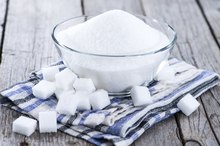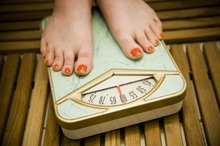Sugar's Effects on Teens
Teens typically consume large amounts of sugar daily: 34 teaspoons for the 14- to 18- year-old age group, as opposed to 22 teaspoons for adults, according to the American Heart Association, or AHA. The biggest offending foods are soft drinks, candy, cakes, cookies and pies. Although the AHA has not made recommendations for teens as far as limiting sugar consumption, it does recommend no more than six teapsoons daily for women and no more than nine teaspoons for men. Sugar causes a number of negative health consequences for both adults and teens.
Sugar
Although you may be more familiar with sucrose, or table sugar, there are many other types of sugar added to foods that go by names you might not recognize immediately: agave nectar, cane sugar, corn syrup, dextrose, evaporated cane juice, fructose, lactose, maltose, molasses and corn sweetener, to name a few. According to Nancy Appleton, Ph.D., a clinical nutritionist and author of "Lick the Sugar Habit," there are 146 ways in which sugar affects your health. Some of these include hyperactivity, anxiety, difficulty concentrating and crankiness in children. Sugar also contributes to food allergies, reduced defense against bacterial infections, increased cholesterol, diabetes and cardiovascular disease.
- Although you may be more familiar with sucrose, or table sugar, there are many other types of sugar added to foods that go by names you might not recognize immediately: agave nectar, cane sugar, corn syrup, dextrose, evaporated cane juice, fructose, lactose, maltose, molasses and corn sweetener, to name a few.
- According to Nancy Appleton, Ph.D., a clinical nutritionist and author of "Lick the Sugar Habit," there are 146 ways in which sugar affects your health.
Weight Gain
How Does Junk Food Affect Developing Teens?
Learn More
Sometimes people don't sense calories in drinks the same way they do in solid foods. Many think juices are healthier than sodas because they contain vitamins, but juices also contain large amounts of hidden sugar. Researchers at Children's Hospital in Boston studied two groups of teenagers for six months. One group continued to drink the same beverages they had been -- daily servings of Coke, Gatorade and other sugary drinks. Another group replaced sodas, juices and energy drinks with bottled waters and artificially sweetened diet sodas. The heaviest one-third of teens who drank calorie-free beverages showed a significant decrease in body mass index compared to the control group. These teens also lost about 1 lb. per month without any other changes in behavior.
- Sometimes people don't sense calories in drinks the same way they do in solid foods.
- One group continued to drink the same beverages they had been -- daily servings of Coke, Gatorade and other sugary drinks.
Hyperactivity and Mental Disorders
A Norwegian study, published in the October 2006 "American Journal of Public Health," surveyed more than 5,000 15- and 16-year-olds on their habits regarding soda consumption. The survey also asked them questions related to mental health, hyperactivity and distress. The researchers found teens who skipped breakfast and lunch were some of the heaviest soda consumers. High soft drink consumption was linked with hyperactivity, with teens who consumed four or more soft drinks daily having the worst mental health symptoms. Health authorities in Norway recommend that only 10 percent of daily calories come from sugar, but at least 25 percent of Norway's teen boys consume that amount of sugar from soft drinks alone.
- A Norwegian study, published in the October 2006 "American Journal of Public Health," surveyed more than 5,000 15- and 16-year-olds on their habits regarding soda consumption.
Heart Risk
The Side Effects of Sucrose
Learn More
Teenagers may not give much thought to heart problems as they ingest large amounts of sugar, but a recent study shows maybe they should. A study published online in January 2011 in "Circulation: Journal of the American Heart Association" connects heavy sugar consumption during the teen years with a higher risk of heart problems later in life. The study used data from the National Health and Nutrition Examination Survey that included data from nearly 2,200 teens between 1994 and 2004. Teens who consumed the most added sugar had lower rates of "good" cholesterol when compared to those who ate the least sugar. Those teens also had higher levels of "bad" cholesterol and triglycerides. "Good" cholesterol helps get rid of harmful cholesterol, while "bad" cholesterol is artery-clogging.
- Teenagers may not give much thought to heart problems as they ingest large amounts of sugar, but a recent study shows maybe they should.
Related Articles
References
- MSNBC.com; Cut Back, Way Back, on Sugar, Says Heart Group
- NaturalNews.com; The Harmful Effects of Sugar and Choosing Healthy Alternatives; Teya Skae; February 2008
- NaturalNews.com; Link Proven Between Sugar Consumption and Hyperactivity, Mental Disorders in Teens; Jessica Fraser; September 2006
- U.S. Department of Health and Human Services and U.S. Department of Agriculture. 2015–2020 Dietary Guidelines for Americans. 8th Edition. 2015.
- Rippe JM, Angelopoulos TJ. Sucrose, High-Fructose Corn Syrup, and Fructose, Their Metabolism and Potential Health Effects: What Do We Really Know? Adv Nutr. 2013;4(2):236-245. doi:10.3945/an.112.002824
- U.S. Department of Agriculture. Cut Down on Added Sugars. 2016.
- Rampersaud GC, Kim H, Gao Z, House LA. Knowledge, perceptions, and behaviors of adults concerning nonalcoholic beverages suggest some lack of comprehension related to sugars. Nutr Res. 2014;34(2):134-142. doi:10.1016/j.nutres.2013.11.004
- Tandel KR. Sugar substitutes: Health controversy over perceived benefits. J Pharmacol Pharmacother. 2011;2(4):236-243. doi:10.4103/0976-500X.85936
- Bray GA. Energy and Fructose From Beverages Sweetened With Sugar or High-Fructose Corn Syrup Pose a Health Risk for Some People. Adv Nutr. 2013;4(2):220-225. doi:10.3945/an.112.002816
- American Dental Association. American Dental Association Encouraged by Soda Makers’ Pledge to Promote Smaller Sizes, Less Sugar. 2014.
- U.S. Department of Health and Human Services and U.S. Department of Agriculture. 2015–2020 Dietary Guidelines for Americans. 8th Edition. 2015.
Writer Bio
Betty Holt began writing professionally in 1966 as co-editor of a summer mimeographed newspaper, "The Galax News." She has written for "Grit," "Mountain Living," "Atlanta Weekly" and others. Holt received a Bachelor of Arts in psychology and Master of Education from the University of North Carolina-Chapel Hill. Her articles specialize in health, fitness, nutrition and mental health.









